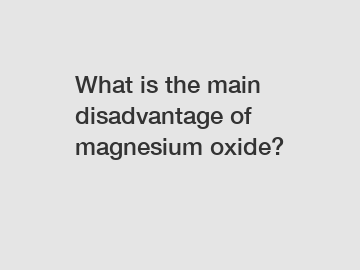What is the main disadvantage of magnesium oxide?
Magnesium oxide is a widely used supplement that many people turn to in order to boost their magnesium levels. Magnesium is an essential mineral that plays a significant role in the body's overall health and functioning. It is involved in more than 300 biochemical reactions, including energy production, muscle function, and bone health. Taking a magnesium oxide supplement can help ensure that you are getting an adequate amount of this important mineral.
While magnesium oxide has many benefits, it also has some disadvantages that should be taken into consideration. One of the main disadvantages of magnesium oxide is its poor bioavailability.
Bioavailability refers to the amount of a substance that is absorbed and utilized by the body. In the case of magnesium oxide, only a small percentage of the magnesium is actually absorbed by the body when it is taken in supplement form. This means that you may not be getting as much magnesium as you think when you take a magnesium oxide supplement.

The poor bioavailability of magnesium oxide is primarily due to its low solubility in water. Magnesium oxide is a salt that is formed when magnesium reacts with oxygen. This salt is not very soluble in water, which means that it does not easily dissolve and can be difficult for the body to absorb.
In contrast, other forms of magnesium, such as magnesium citrate or magnesium glycinate, are more soluble and have higher bioavailability. These forms of magnesium are more easily absorbed by the body and are therefore more effective at raising magnesium levels.
Another disadvantage of magnesium oxide is that it can cause gastrointestinal issues in some people. Because magnesium oxide is poorly absorbed, a larger amount of the supplement may pass through the digestive tract without being absorbed. This can lead to diarrhea, cramping, and bloating in some individuals.
In addition, magnesium oxide has a laxative effect, which can further exacerbate gastrointestinal issues. The laxative effect of magnesium oxide can be beneficial for those who struggle with constipation, but it can be a drawback for those who are sensitive to its effects.
Despite these disadvantages, magnesium oxide can still be a useful supplement for some individuals. It is often recommended for people who have magnesium deficiency or who are at risk of developing it. In these cases, the benefits of taking a magnesium oxide supplement may outweigh the disadvantages.
If you choose to take a magnesium oxide supplement, there are a few things you can do to improve its absorption and reduce the risk of gastrointestinal issues. Taking the supplement with food can help increase absorption, as can choosing a lower dosage and gradually increasing it over time.
It is also important to speak with a healthcare provider before starting any supplement regimen, including magnesium oxide. They can help determine if you have a magnesium deficiency and recommend the best form of magnesium for your needs.
In conclusion, while magnesium oxide has some disadvantages, such as poor bioavailability and potential gastrointestinal issues, it can still be a beneficial supplement for some individuals. By being aware of these drawbacks and taking steps to improve absorption, you can maximize the benefits of magnesium oxide and support your overall health and well-being. Remember to consult with a healthcare provider before starting any new supplement regimen to ensure that it is safe and appropriate for you.
The company is the world’s best Benzoylcyclopentane CAS.5422-88-8, Wuhan Lwax, Benzoylcyclopentane CAS.5422-88-8 supplier. We are your one-stop shop for all needs. Our staff are highly-specialized and will help you find the product you need.

Comments